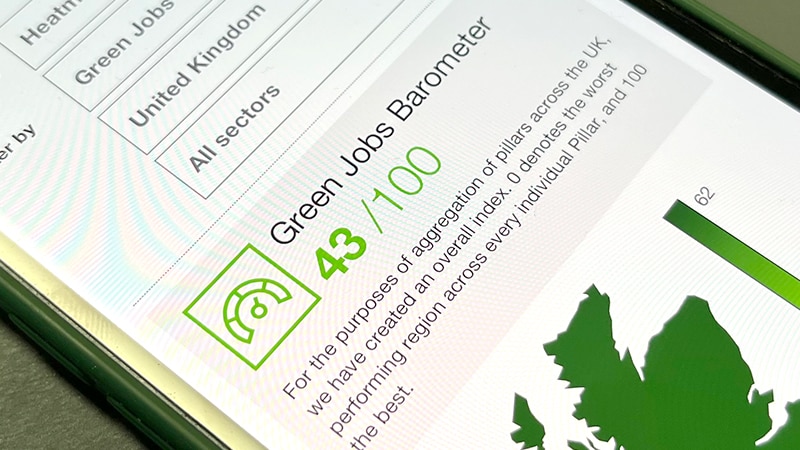
Green Jobs Barometer - working to ensure a fair transition to net zero
Progress towards a net zero economy should be celebrated, but there is also a very real risk that some sectors and communities could be left behind. Recognising the role data will play in ensuring green jobs don’t only grow in the most fertile spots, we developed our Green Jobs Barometer.
Setting the scene
Last year, the Government published its net zero strategy, providing a roadmap for the UK to decarbonise by 2050. Coupled with COP26, this marked a global shift in attitudes, setting a crystal clear mandate for governments and businesses to lead the transition.
We realised that the transition - while vital - will pose significant disruption and challenges, including a huge impact on communities and regional economies across the UK. More specifically, on employment in terms of both job creation and losses.
To better understand the impact, we developed the Green Jobs Barometer, a platform to track green job creation, the wider benefits of these roles, job losses, carbon intensity of employment, and worker sentiment.
How we helped
The Barometer found that the green jobs market remains small and needs to be scaled up. Only 1.2% (124,000) of total advertised jobs in the measured period met our ‘green’ definition. More starkly, the data highlighted that there is already significant regional disparity arising. Left unchecked, existing inequalities in access to economic opportunity could be exacerbated.
The Barometer has provided a platform for us to engage with clients, stakeholders and policymakers to discuss their perspectives and how to mitigate potential negative impacts. It has kickstarted a discussion about what is needed on both a national and regional level.

“We realised that although the UK has a commitment to reaching net zero by 2050, there was no research or data on how specific sectors or regions were performing in order to reach this target. The Green Jobs Barometer has provided a platform for PwC to engage with stakeholders both nationally and regionally to ensure that no sectors or communities are left behind in the transition. I hope with every iteration of the report, we continue to drive this important discussion.”
Making a difference
The research has generated high levels of engagement. It has enabled us to drive conversation on the risks and opportunities of net zero, especially in the regions facing the greatest challenges. Targeted policies, investment, education, and collaboration between business, governments and education providers will be required to ensure fairness; our analysis is designed to illuminate where these interventions are most necessary.
We have also hosted a series of regional conversations with businesses, local political leaders, government authorities and skills providers on how businesses, workers and communities can develop a detailed plan for how to achieve net zero.
Looking ahead, we plan to update the Barometer’s findings every six months to reveal how regions and sectors are progressing.







